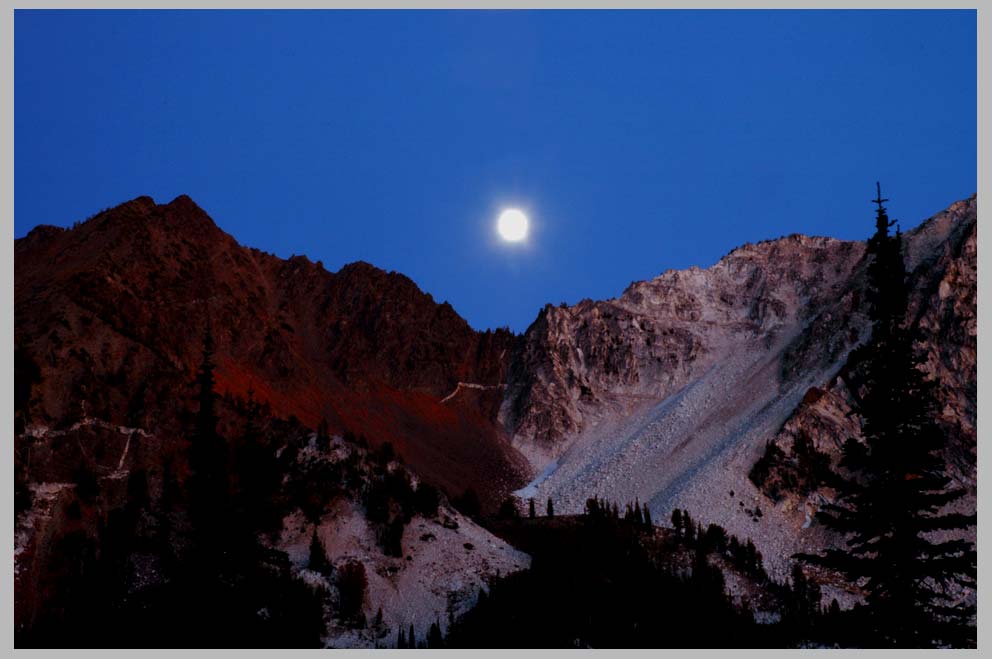
Moonrise Over Red Mountain / (White) Granite Mountain, Eagle Cap Wilderness . . .
View East from Muir Lake, IX.12.2008 ('Crater Lake'...)

Moonrise Over Red Mountain / (White) Granite Mountain, Eagle Cap Wilderness . . .
View East from Muir Lake, IX.12.2008 ('Crater Lake'...)
Mountains & Meaning
What mountains mean to us in many unconscious, tacit,
yet powerful ways conditions or forms our attitudes towards
them, as well as our own behavior once we have entered
them. Yet, the metaphysics of mountains, in my view, suffers
tremendously from outmoded stereotypes, which may or
may not be partially true—like monks in meditation in the
high plains of Tibet (now being replaced by Chinese
machine guns), or Cowboys and Indians fighting it out in the
rugged canyons and highlands of the American West—but
they greatly impede the discovering of new and more currently
appropriate ways of seeing and being.
Mountains have, after-all—just as the North and South
poles of the planet—become ground zero for the effects
of climate chaos. So any disaster already unfolding down
in the lowlands one can easily amplify by at least a factor
of two once we enter the land above the trees. Glaciers
are disappearing at a very much faster pace than any expert
I know of had predicted until very recently. Permafrost is
melting. Artifacts in the Alps, a range I for personal reasons
feel very close to, are coming out of the melting ice
around the Schnidejoch between Wallis and Berner Oberland
which are more than six thousand years old. The great
Whitebark Pines, some of the oldest trees in the American
Northwest, are becoming what I think of as the polar bear
of trees because they are literally being forced off the planet,
off the tops of mountains. As temperatures rise just one
or two degrees c., the Whitebarks are falling prey to mountain
pine beetle infestations against which they have never
evolved defenses.
So what do mountains mean to me? Well, obviously, many
things. What comes immediately to mind is Emerson's saying,
"Poetry is saying the most important things in the simplest
possible of ways." That, it seems to me, is what the mountains
are saying to us. The most important things, in the very simplest
of ways. The way a river begins out of nowhere by bubbling
up from the ground as a trickle of pure, crystalline spring water.
Or a genus of plants like the Buckwheats miraculously and
artfully adapts to the wind and cold as each species progressively
becomes lower and more compact the higher it grows. Or the
graceful, almost timeless meanders of an alpine boggy brook,
full of healthy lightning fast fingerlings, going so against the
grain of the straight-line concrete roads and channels of present
Western culture. Or the wonderful symbiosis—a kind of living
together art-form—of the Nutcracker and Whitebark Pine, the
tree providing nutritious nuts for the bird, the bird playing the role
of haphazard gardner for the tree as it caches hundreds of nuts,
many of which it forgets and that then go onto sprout and
become new stonepine seedlings.
This is the stuff not just poems are made of, but also myth
and fairy-tale. And yet, where are the children? Nowhere in
the Northwest, nowhere in the Wallowa wilderness have I
seen children under 12 years of age. I think instantly of
Sacajawea of the great Lewis & Clark Corps of Discovery
carrying her little infant Jean Baptiste safely and with an utterly
amazing self-confidence—truly a great gift of her Shoshone
culture—from present day North Dakota to the Oregon coast
and back again. Climb Everest? Well, yes, perhaps. But in my
book, let some young intrepid mother / alpinist repeat or better
that remarkable feat.
So what do the mountains mean to us? Evidently, not a place
to teach the young—to let them learn for themselves—the most
important things, in the simplest possible of ways. This must
change. And I am confident it will change once we resolutely
turn to face the Sun, and abandoned the failure of the culture
of oil, war and waste.
Imagine sitting around the fire-ring at night and looking out
on the moonrise pictured above. How would you open up the
eyes of a child to the scene? I would say: "You see that red
earth mountain on the left? And look at that mountain almost
as white as snow on the right! Do you see how the Moon is
rising right where the two mountains join hands? That's the
Moon's way of blessing them both. That's the Moon's way of
telling the 'red' Native American peoples and the 'white'
European-American peoples that they need to make spiritual
peace for all the bad things that happened in the past. Pretty,
isn't it?"
Let me sound out this little meditation with a childlike miniature
in the manner of Emily Dickinson:
I lost my spirit the other day.
It was nothing I had read,
Or anything I had done or said,
It was something
I did not,
could not, say.
The mountains made it stay.
Muir Lake,
Eagle Cap Wilderness,
Oregon, IX.12.2008